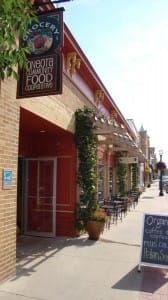National Cooperative Grocers Association (this link no longer available)
by Karen Zimbelman
Iowa City, IA – National Cooperative Grocers Association (NCGA) has released Healthy Foods Healthy Communities: The Social and Economic Impacts of Food Co-ops, a quantitative study on food co-ops compared to conventional grocery stores. The study’s compelling results demonstrate the many ways that cooperative businesses do well while doing good.

Unlike their conventional counterparts, co-ops are owned and governed by member-shoppers and rooted in principles like community, voluntary and open membership, economic participation and cooperation. Because of these principles and practices, food co-ops inherently serve and benefit the communities where they are located. For example, the study finds that for every dollar spent at a food co-op, $0.38 is reinvested in the local economy compared to $0.24 at conventional grocers.
“A quantitative assessment like this that shows the impacts of food co-ops has never been done,” said Robynn Shrader, chief executive officer for NCGA. “We wanted to put numbers to what we’ve known for decades,” Shrader continued, “that food co-ops generate tangible social and economic benefits for the communities they serve in ways that conventional grocers just can’t.”
NCGA’s member and associate food co-ops operate 165 stores, generate more than $1.4 billion in annual revenue and are owned by 1.3 million consumer owners. Individually, co-ops serve the distinct needs of communities from major markets like Portland and Minneapolis to the Ozarks in Arkansas. Together, co-ops have the purchasing power to rival conventional grocery chains, and the good business practices to truly make the world a better place.
Supporting Local Food Systems and Sustainable Foods
Though “local” has popped up in conventional grocery stores in recent years, retail food co-ops are leaps and bounds ahead of the pack. Where conventional grocers work with an average of 65 local farmers and other local producers, food co-ops work with an average of 157. Likewise, locally sourced products make up an average of 20 percent of co-op sales compared to 6 percent at conventional stores.
Years after creating the market for organic foods, co-ops are still the place to find them. Of produce sales at food co-ops, 82 percent are organic, compared to 12 percent for conventional grocers. Organics make up 48 percent of grocery sales in food co-ops, compared to just 2 percent in conventional grocers.
Local Economic Impact
The economic impact that a grocery store has on its local economy is greater than just the sum of its local spending, because a portion of money spent locally recirculates. Food co-ops purchase from local farmers who, in turn, buy supplies from local sources, hire local technicians to repair equipment and purchase goods and services from local retailers. To some extent, conventional grocers do too, but the gap is still significant. For every $1,000 a shopper spends at their local food co-op, $1,604 in economic activity is generated in their local economy – $239 more than if they had spent that same $1,000 at a conventional grocer.
Employee Benefits
The average co-op earning $10 million per year in revenue provides jobs for over 90 workers. In total, 68 percent of those workers are eligible for health insurance, compared to 56 percent of employees at conventional grocers. Co-op employees also earn an average of nearly $1.00 more per hour than conventional grocery workers when bonuses and profit sharing are taken into account.
Environmental Stewardship
Grocery stores – co-ops and conventional alike – generate a significant amount of waste. What sets retail food co-ops apart is what they do with that waste. Co-ops recycle 96 percent of cardboard, 74 percent of food waste and 81 percent of plastics compared to 91 percent, 36 percent and 29 percent, respectively, recycled by conventional grocers.
At a co-op grocer, fresh, delicious food is just the beginning. To view results from the complete report, visit www.strongertogether.coop/food-coops/food-co-op-impact-study.
About the Study
NCGA partnered with the ICA Group – a national not-for-profit research organization – to compile the data used to develop Healthy Foods Healthy Communities: The Social and Economic Impacts of Food Co-ops. The ICA Group compiled data from industry and government resources, food cooperative financial data collected by CoopMetrics for NCGA, and previous NCGA surveys. The ICA Group developed two additional surveys, one targeted to retail food co-ops and the other to the conventional grocery industry.
About National Cooperative Grocers Association
National Cooperative Grocers Association (NCGA), founded in 1999, is a business services cooperative for retail food co-ops located throughout the United States. NCGA helps unify food co-ops in order to optimize operational and marketing resources, strengthen purchasing power, and ultimately offer more value to natural food co-op owners and shoppers everywhere. Our 128 member and associate co-ops operate 165 storefronts in 35 states with combined annual sales over $1.4 billion. NCGA is a winner of the dotCoop Global Awards for Cooperative Excellence in recognition of the application of cooperative values and principles to drive cooperative and business success. In the 2012, cooperatives around the world will celebrate the International Year of Cooperatives. For a map of NCGA member and associate co-ops, visit www.ncga.coop. To learn more about co-ops, visit www.strongertogether.coop or www.go.coop. To learn more about the US observance of the International Year of Cooperatives, visit www.usa2012.coop.

